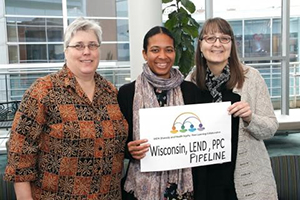WI MCH Programs Team Up to Increase Diversity (WI UCEDD/LEND)
June 26, 2017

|
| Wisconsin Team Members include Left to Right: Julie Schears, Sr. Outreach Specialist, WI LEND Training Program; Tamicah Gelting, MS, OTR/former Pipeline trainee; Vickie Moerchen, PT, PhD, Director of Pipeline Training Program |
The Division of Maternal Child Health (MCH) Workforce Development created the 2017 Diversity and Health Equity Peer Learning Collaborative (DHEC) for MCH Training Programs interested in addressing issues related to diversity, linguistic competence and health equity. Wisconsin was selected as one of seven MCH peer groups to be a part of this national effort.
Developed through a partnership between the WI Leadership Education in Neurodevelopmental Disabilities (LEND) Program at the UW-Madison Waisman Center, the Pediatric Pulmonary Centers (PPC) at UW Hospital, and the Pipeline Program at UW-Milwaukee, the WI core team members attended a February kick-off meeting in Birmingham, Alabama, and both core and extended team members attend monthly DHEC developed webinars. Besides providing resources such as one-on-one mentorship, vetted diversity materials and expert trainers, the DHEC created an online Community of Practice that allows sharing of products and resources as well as providing a forum for discussion between the state peer partners.
As part of the Learning Collaborative, the WI team is working on strategies to increase racial, ethnic and linguistic diversity in their training programs through the development of information gathering materials and follow-up strategies. The goal is that these efforts will assist the LEND and PPC programs in both identifying potential candidates from underrepresented backgrounds for their graduate training programs and connect with the students during the critical first year of graduate school by engaging areas of interest, directing them to needed campus supports and helping to find potential discipline or peer mentors. Additional efforts include strategic website updates, building relationships with campus and community diversity partners, and developing a collaborative MCH WI informational flyer and branding.







